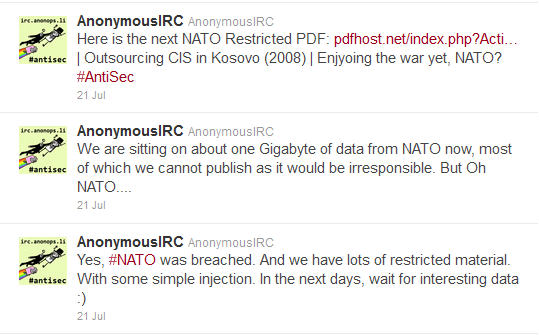
On July 21st, 2011, Anonymous—the 4chan-associated hacker collective with a cyber-libertarian bent—announced that they had breached NATO’s secure database and retrieved roughly a gigabyte of restricted data. To verify their claim, Anonymous posted a “NATO restricted” document to Twitter. Interestingly, Anonymous has been very cautious in leaking the documents it has obtained, publicly declaring that it would be “irresponsible” to publish most of it. Much of what has be published is “Redacted, for sanity.”

Anonymous was recently in the news for shutting down several payment processing websites like Visa and Mastercard after these companies decided to stop processing donations to it’s ideological ally, Wikileaks. The interesting thing here, however, is not the similarities between Anonymous’ NATO breach and the culture of Wikileaks but what makes them distinct: Wikileaks is a largely passive organization that reviews and posts whatever leaks are submitted, while Anonymous is actively breaching organizations, seizing their data, and, ostensibly, disseminating it for the public good. Because of its socially conscious nature, this latter behavior has been labeled “hacktivism.” Anonymous displayed the ideological motivation behind their activities in a recent letter responding to the coverage of the NATO incident. The letter expressed a range of conventional libertarian concerns: for example, “[g]overnments lying to their citizens and inducing fear and terror to keep them in control by dismantling their freedom piece by piece.”
Historically, leaks are the product of activism within an institution (e.g., Daniel Ellsberg‘s famous leak of the Pentagon Papers). Anonymous is demonstrating, however, that in the highly liquid world of digital information, leaks no longer need to be pushed from within, but can be pulled from without. That is to say, institutional outsiders can target the secret documents of an organization and reveal them to the public. We might aptly describe this as a form of sousveillance (i.e., surveillance from below).
The question raised by Anonymous’ activities is whether—in light of the knowledge that it is more difficult than ever to control the flows of information—institutions will be compelled to change/reform their behavior. Is enforced transparency an effective remedy to the ills created by institutionally-consolidated power structures?


Comments 1
Replqwtil — August 18, 2011
An interesting parralel: the highly liquid world of data, and the highly liquid nature of Anonymous as an organization. Does having the institution matching the medium make it's actions possible?